YUVA celebrates International Youth Day 2018
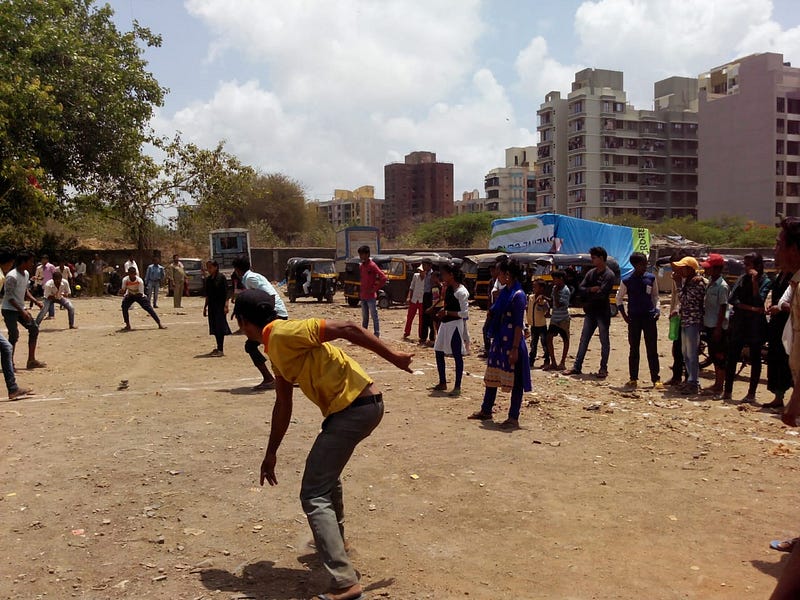
The World of Young People
Currently, 1.8 billion of the world’s population and 365 million Indians comprise those between the ages of 10–24 years, the youth. This is the largest youth population the world has ever seen. By 2020, India is set to become the world’s youngest country with 64 percent of its population in the age group of 15–35 years. However, youth participation in social, civic and political affairs nowhere reflects these large numbers. Where are the voices of the youth?
About International Youth Day
In 2000, International Youth Day was observed for the first time. Since then, 12 August has been dedicated to ‘draw attention to a given set of cultural and legal issues surrounding youth’. The UN Security Council Resolution 2250 acknowledges the urgent need to engage young peace-builders in promoting peace and countering extremism. This day is globally significant, given the challenges faced by the youth — young refugees worldwide, the issue of child soldiers, low literacy rates, difficulties in accessing health and sanitation facilities, employment concerns … the list goes on. The observance of International Youth Day, therefore, is important on multiple levels, especially in reminding the youth about the power of their collective participation and action in driving change.
The Need for Safe Spaces for Youth
The theme for this year’s International Youth Day was ‘safe spaces for youth’. A safe space, by definition, is one that allows people to ‘come together, engage in activities related to their diverse needs and interests, participate in decision making processes and freely express themselves’. As the name suggests, this is an environment that provides safety and comfort for young people to develop their own identity. It is a space that does not discriminate on the basis of race, caste, gender, class, or any other divisions. The World Programme of Action for Youth, which is the UN framework for youth development, prioritises the provision of ‘leisure activities’ as essential to the psychological, cognitive and physical development of young people.
However, given the rapid pace of urbanisation and the shrinking of safe spaces for expression, the presence of such spaces has been a challenge in recent years. In many informal settlements across India, children and young persons lack the space for basic requirements, let alone to play or study. Their development and growth prospects are impeded under these circumstances, leaving them ill-equipped to undertake efforts for their own empowerment and those of others around them.
The ‘Claiming Spaces’ Campaign so Far
Over the last few years, YUVA has tried to counter this narrative, working with children and young persons to facilitate the development of safe spaces across Mumbai. In 2017, the ‘claiming spaces’ campaign was formally launched even though efforts had begun much earlier, and youth across the city lent their support to reclaim spaces that can be used for play, expression, and much more. To know more about the campaign so far, click here.
During ComplexCity, a week-long series of events in March 2018 to engage with the city, over 500 youth from across Mumbai and Greater Mumbai discussed the campaign that they had been leading so far, and how they planned to take it ahead. International Youth Day 2018 offered the youth another chance to engage on this theme, demonstrate their commitment to it, and further it among the city’s youth.
Looking Back on International Youth Day celebrations
We began the day with activities in different parts of the city.
- In Ambujwadi, Malwani, Malad, the youth used the medium of sports to drive the importance of this day, and their need for safe spaces for expression in the community.
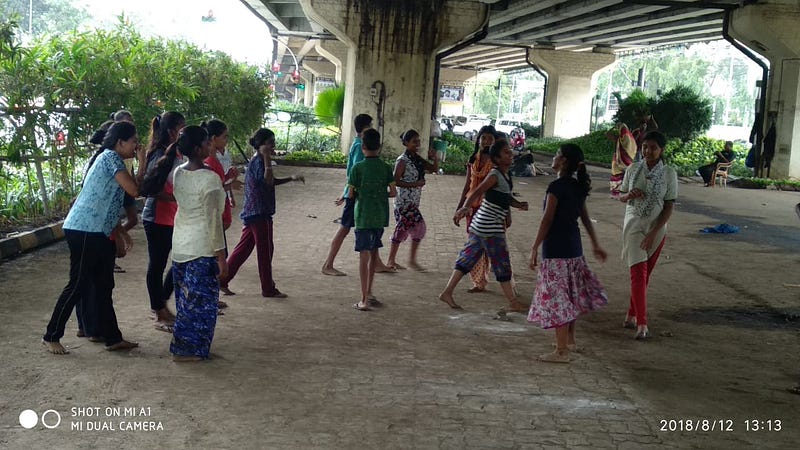
- In Vile Parle, the youth led a discussion on the significance of International Youth Day. Following this, fun games and activities were planned. The youth played a traditional game called lagori, which is played in two teams using flat stones and a ball. The games took place under the Western Express Flyover near the airport and the youth decided that they will continue playing here weekly to claim this space.
- The Kandivali youth in Charkop and Bhabrekar Nagar played kho kho, a running game, on a street outside the Slum Rehabilitation Authority building. Each play space engaged around 15 youth including both boys and girls.
- In Bhim Nagar and Pragati Nagar, Parel, ice-breaking activities took place to explain what claiming spaces is all about. The youth drew flow charts and community spaces to better engage on this theme, and each participant presented their drawings and explained their hopes for these locations. The youth reminisced about their childhood activities and many expressed hope about finding spaces to play, study, and enjoy some time. ‘Given the diverse profile of youth engaged in these activities, their interactions were interesting to note’, said Namdeo Guldagad, the YUVA saathi facilitating the day’s activities. He added, ‘It is difficult to spread awareness among girls in these settlements when they barely leave the house, but thanks to recent efforts a lot more girls attend events now’.
- ‘When did we first start celebrating International Youth Day 2018? Why is it so important for us? What role can the youth play in ushering inclusive social change?’. Even as the youth of Lallubhai Compound, Mankhurd, struggle to find safe spaces within their community, they engaged on these questions before enjoying some sporting activities organised.
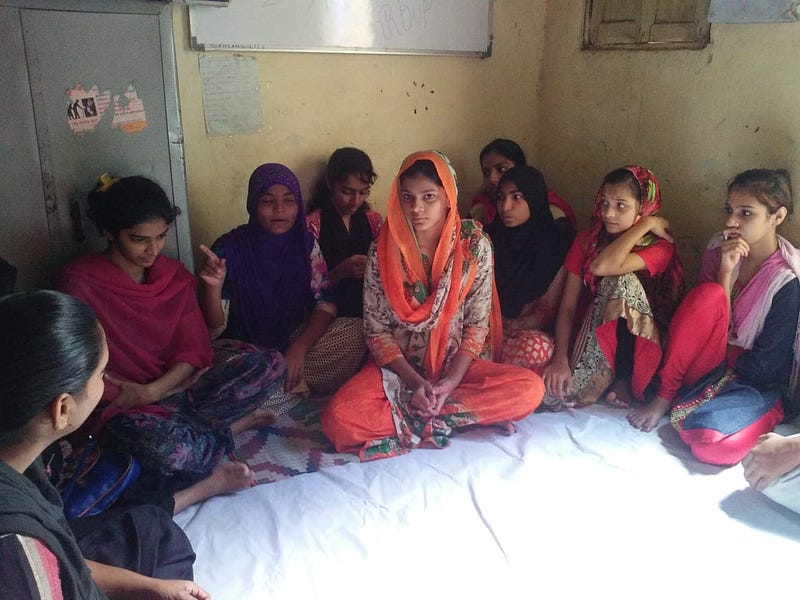
- In Bandra, youth discussed concerns areas, such as access to education, the sanitation problem, human rights issues, gender sensitivity and so on, before engaging with the theme of safe spaces.
- The youth of Navi Mumbai participated in a race. After that, they staged a street play, bringing the community together to highlight the demand for safe spaces.
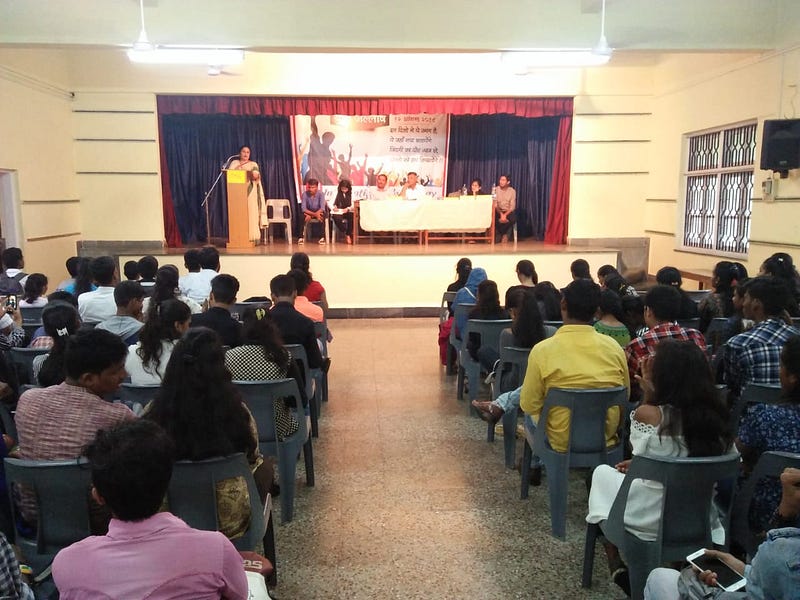
In the evening, 200 youth attended a plenary session and a cultural programme at Goregaon East. Among the panellists was Member of State Legislative Council Vidya Chavan. While she addressed the issue of claiming spaces to be in accordance with youth rights, she also insisted that the youth must focus on their education because of how important their role is in achieving future goals. Journalist Nissar Ali, also on the panel, highlighted issues of space, skilling, empowerment and education of youth. Maharastra’s Youth Policy was brought up by the panellists, with discussions focusing on how it can be improved. Youth panellist Bala Akhade spoke about YUVA’s work in Ambujwadi, Malwani, and how instrumental youth development has been in informal settlements. He also spoke about Article 32 of the Constitution and how youth can address the rights that are being withheld from them. ‘There were things even I was unsure about and this panel cleared those doubts for me’, he later reflected. Another youth panellist Pratiksha, part of the Vile Parle youth group, put forth her experience of growing up in an area where there was never a place to play. ‘You realise more keenly the importance of community space when it is lacking’, she said, highlighting what we often take for granted. Many of the audience members also added to the discussion of what safe spaces mean to them.
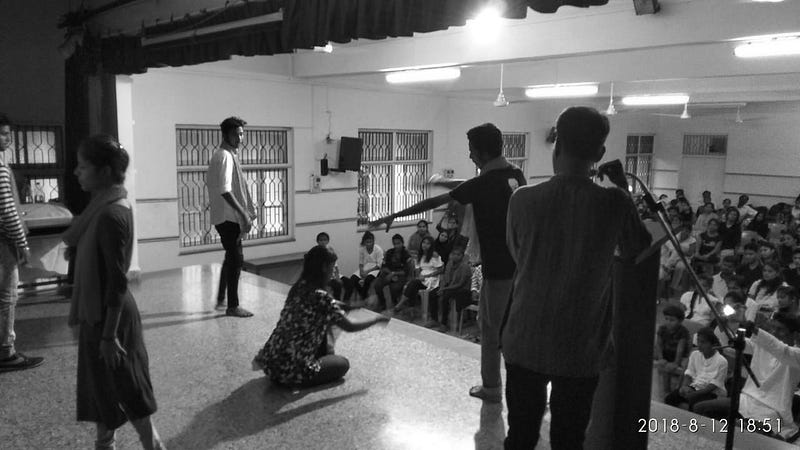
The celebrations ended with the performance of a street play by a youth group from Navi Mumbai. Their performance pointed out the ill-effects of alcohol addiction on family members and its grave personal and economic cost.
In this way, YUVA celebrated International Youth Day across spaces, involving hundreds of youth to spread the message of ‘safe spaces’ and discussing pressing concerns throughout the day. The youth are looking forward to take ahead their efforts through the year with the same energy and enthusiasm.
Sara Shirodkar, Volunteer


